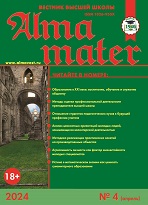UDC 378-042:004
https://doi.org/10.20339/AM.07-21.024
V.I. Lukashchuk is Dr. Sci. (Sociology), Ass. Prof., Prof. of Department of Public and Corporate Governance at Academy of Marketing and Social and Information Technologies IMSIT, Krasnodar e-mail: luka81@list.ru
Researched is the process of undergoing great changes, caused by the transition of all universities in the country to online education in the context of the coronavirus pandemic. The article deals with specific problems, risks and challenges related to the digitalization of higher education: digital inequality, closely related to digital literacy, the lack of a unified way of communication between students and teachers, the lack of generally accepted platform solutions for conducting classes online; the actual growth of the teacher’s workload in the conditions of digitalization of education, which is not yet taken into account in the system of rationing of remuneration, professional burnout in a sufficiently large number of teachers, lack of motivation and self-discipline of students, increased bureaucratization of the higher education system. The experience of implementing digitalization into education during the pandemic dispelled myths about the benefits of an immersive education model and individualized learning based on online technologies. Digitalized learning is focuses primarily at memorization and reproduction, and not at comprehension and critical perception. A comprehensive solution to these problems is the introduction of new models of educational programs.
Key words: higher education, online learning, digitalization of education, digital transformation, distance learning, digital inequality.
References
1. Ahlquist, J. Digital Leadership in Higher Education: Purposeful Social Media in a Connected World. Herndon: Stylus Publishing, 2020. 312 р.
2. Kelly, K., Zakrajsek, T.D. Advancing Online Teaching: Creating Equity-Based Digital Learning Environments (Higher Education). Herndon: Stylus Publishing, 2020. 264 р.
3. Kostyleva, T. Rosstat published data on broadband penetration in the regions of Russia. URL: https://d-russia.ru/rosstat-opublikoval-dannye-po-proniknoveniju-shpd-v-... (accessed on: 24.05.2021).
4. Reference on the results of a survey of Russian university students about working remotely during the forced transition to distance learning in March-June 2020. URL: https://profsobranie.ru/201 (accessed on: 24.05.2021).
5. Valek, J., Sladek, P. Immersed into Digital World: Learning and Students’Perception. Procedia — Social and Behavioral Sciences. 2012. No. 69. P. 1866–1870.
6. Martin, A. DigEuLit a European Framework for Digital Literacy: a Progress Report. Journal of ELiteracy. 2005. No. 2. P. 130–136.
7. Kalantzis, M., Cope, B. The Teacher as Designer: Pedagogy in the New Media Age. E-Learning and Digital Media. 2010. Vol. 7. No. 3. Р. 200–222.
8. Verbitsky, A.A. Digital learning: problems, risks and prospects. Homo cyberus. 2019. No. 1 (16). URL: http://journal.homocyberus.ru/Verbitskiy_AA_1_2019 (accessed on: 24.05.2021).
9. The collapse of universities: an alternative education system is being created in Russia. Official website of RBC. URL: https://www.rbc.ru/spb_sz/17/04/2019/5cb6d1109a79478bb3ffc057 (accessed on: 24.05.2021).
10. Lukashchuk, V.I., Zotov, V.V. Innovative bureaucracy as a mechanism for managing the modern system of higher education. Tambov University Review. Series: Social Sciences. 2017. Vol. 3. No. 3 (11). P. 5–10.












.png)






